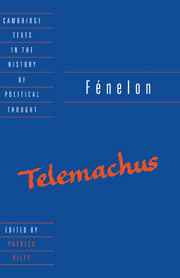Introduction
Published online by Cambridge University Press: 05 June 2012
Summary
Françis de Salignac de La Mothe-Fénelon was born in Périgord in 1651, the son of an aristocratic provincial family which was distinguished but threadbare. Ordained a priest in 1675, he was within three years given an important ministry in the Church – that of spiritual guide to the “New Catholics” (ex-Huguenots) in northern France. This ministry lasted for a decade (1678–88), and was crowned by the publication of the treatise On the Education of Girls (1687), which first revealed Fénelon's classicizing taste for the ancient pastoral simplicity depicted by Virgil in the Aeneid and Georgics. By this time the Abbé Fénelon had caught the eye of Bossuet, the bishop of Meaux and the most powerful French ecclesiastic of the grand siècle: for him Fénelon produced his Réfutation de Malebranche (c. 1687/8), which attacked Malebranche's notion of a “Cartesian” Providence générale operating through simple, constant, universal laws, and sustained Bossuet's notion (outlined in the Histoire universelle) of a Providence particulière which had furnished David and Solomon to ancient Israel and Louis XIV to modern France. In 1689 he was named tutor to Louis's grandson, the due de Bourgogne (1682–1712); and it was for his royal pupil that he was soon to write Télémaque, fils d'Ulysse (c. 1693–4) and the Dialogues of the Dead. Rhetorically the high point of Fénelon's “court” period was his speech on being received into the Académie Françhise (1693), with its fulsome praise of the Sun King.
Information
- Type
- Chapter
- Information
- Fénelon: Telemachus , pp. xiii - xxxiPublisher: Cambridge University PressPrint publication year: 1994
